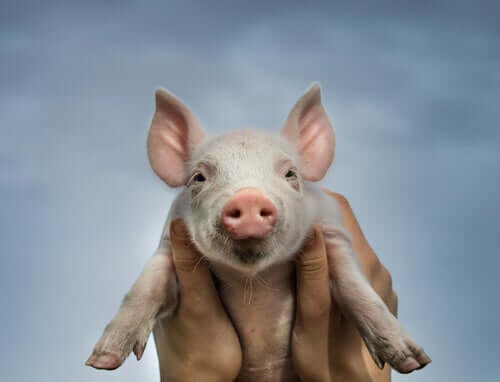Everything You Need to Know About Having a Pig as a Pet


Written and verified by the lawyer Francisco María García
Raising a pig as a pet isn’t the same as having a dog or a cat. Swine require specific care when it comes to their nutrition, hygiene, and environment, in order to preserve their optimal health.
Adopt a pig as a pet: Responsibility is priority
Every pet, no matter what its species, requires and deserves owners that take the responsibility of offering them proper care.
When you adopt an animal, it’s your responsibility to provide optimal conditions for your pet’s development. That includes preventative medicine, the correct conditioning of the environment, balanced nutrition, and regular exercise.
Fads come and go and pets aren’t accessories
Unfortunately, animals often become the victim of temporary fads. Some species simply come into style during certain periods but, inevitably, trends change.
In general, the explanation of this phenomenon has a lot to do with celebrities. It’s not uncommon for a famous person to adopt an exotic pet and show it off on magazine covers.

Not too long ago, common pigs, as well as a Vietnamese pig species, became the center of attention in the spectacle world. As a result, having a pig as a pet seems to be back in style.
Therefore, it’s always best to choose a cat or a dog if you want a pet, as both are domestic animals.
The main positive aspects of having a pig as a pet
Good nature
Pigs possess a docile and curious nature. If they have the right incentive, they may be willing to play, run, and explore new territories. Therefore, a pig as a pet can make for a great companion for children.
What’s more, pigs stand out for the ability to interact. They can come to develop a deep relationship with their owners that’s similar to the relationship that exists between humans and dogs. In other words, they can go for walks, exercise, seek affection, and enjoy living alongside human beings and other pets.

Ability to learn
Pigs are extremely intelligent mammals and tend to learn with great ease. With proper orientation, they can be trained just like cats and dogs.
Some domestic pigs are able to memorize and reproduce different tricks. At the same time, they can recognize their names and obey a variety of commands.
Pigs are clean and have very little hair
We tend to associate pigs with filth, but that’s a mistake. Pigs are naturally clean and don’t like to live in dirty environments. What’s more, they can become very careful when it’s time to eat if they get the proper training.
Like almost all mammals, pigs have hair. But, in comparison to dogs, cats, and rabbits, they have very little.
Having a pig as a pet: providing basic care
When you adopt a pig as a pet, you need to pay special attention to your pet’s nutrition, hygiene, and physical activity. Below, we’ll offer some practical advice for keeping your new companion healthy.
1. Nutrition
Pigs are omnivores, can adapt to a variety of different foods, and require a diversified diet. Nearly 70% of their diet should consist of fruit, vegetables, and fresh grains. And, of course, all of these foods should be in good condition.
Be sure to avoid commercial foods that exist for pigs that live on farms. The purpose of these products is to fatten pigs up for slaughter, not nourish them.
Like any mammal, swine require abundant amounts of hydration. Therefore, if you have a pig as a pet, you need to make fresh, clean water available at all times.
When it comes to your pig’s appetite, you need to establish limits. Pigs can be very gluttonous and become aggressive about defending their food and territory.
2. Hygiene and setting up your pig’s environment
Pigs themselves don’t have an unpleasant odor. The reality is, it’s a lack of proper hygiene which makes pigs dirty and causes an unpleasant smell.
In order to keep your pig clean, you need to clean and prepare its environment. It’s also important to bathe your pig once every two months in order to maintain the health of its skin and hair.
Swine need to preserve their digging habit. Therefore, they need to have access to the outdoors–especially areas with grass and dirt. Since they’re indigenous to temperate climates, the best environment for their development is one with a temperature of between 66 and 75ºF.
3. Physical activity
When pigs live out in nature, they tend to roam freely and mate quite frequently. This allows them to burn off a lot of energy and maintain their ideal weight. When you have a pig as a pet, you need to offer plenty of open space and regular exercise.
4. Preventative medicine
With proper nutrition and physical activity, your pig is unlikely to get sick. However, you need to be sure to vaccinate your pet and take it to a specialized veterinarian on a regular basis.
This text is provided for informational purposes only and does not replace consultation with a professional. If in doubt, consult your specialist.